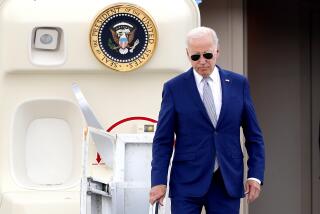Bush Assails China Over Religious Repression
- Share via
WASHINGTON — Vowing to make religious liberty “a guiding doctrine of our foreign policy,” President Bush said Thursday that China’s persecution of believers will thwart that nation’s aspirations of becoming a great power.
Reciting a catalog of religious repression, Bush also said his administration will never condone the abuses that it says are occurring in Sudan, Iraq, Iran, Cuba, Afghanistan and the former Soviet republics in Central Asia.
In a speech to the American Jewish Committee, Bush put the White House imprimatur on a campaign to stop the conduct of business as usual with regimes that practice or condone religious persecution. His words paralleled recommendations issued earlier this week by a bipartisan commission on religious liberty, although he made no direct reference to that panel’s report.
Bush’s assessment of conditions in China is sure to increase Sino-American tensions, already worsened by disputes over the collision of a Navy surveillance plane with a Chinese fighter jet and planned U.S. arms sales to Taiwan.
“China aspires to national strength and greatness,” the president said in prepared remarks. “But these acts of persecution are acts of fear and therefore of weakness. This persecution is unworthy of all that China has been--a civilization with a history of tolerance. And this persecution is unworthy of all that China should become--an open society that respects the spiritual dignity of its people.”
Bush said that “intensifying attacks on religious freedom in China” overshadow the advances Beijing has made in recent decades in economic liberalization, personal mobility, property rights and access to information.
“We hear alarming reports of the detention of worshipers and religious leaders,” Bush said. “Churches and mosques have been vandalized or demolished. Traditional religious practices in Tibet have long been the target of especially harsh and unjust persecution. And most recently, adherents of the Falun Gong spiritual movement have been singled out for arrest and abuse.”
Bush did not suggest economic or political sanctions against regimes that persecute believers, although he pledged to focus international attention on abuses.
The annual report issued Monday by the U.S. Commission on International Religious Freedom called for prohibiting companies that do business with abusive regimes from raising money on U.S. capital markets. Such a provision could cause severe economic disruption for offending countries.
Bush aimed his harshest rhetoric at Sudan, which is embroiled in an ethnic and religious conflict between the Arab Muslim-dominated government and rebels who are mostly black Christians and practitioners of indigenous religions.
“Hospitals, schools, churches and international relief stations have often been bombed by government warplanes,” he said. “The government claims to have halted air attacks. But they continue. Women and children have been abducted and sold into slavery. . . . Some 12,000 to 15,000 people are now held in bondage.
“Sudan is a disaster area for all human rights,” he said. “But the right of conscience has been singled out for special abuse by the Sudanese authorities. Aid agencies report that food assistance is sometimes distributed only to those willing to undergo conversion to Islam.”
Bush said he has directed Andrew S. Natsios, director of the U.S. Agency for International Development, to make sure that humanitarian assistance reaches the needy in Sudan without religious intimidation.
Bush also asserted that “Iraq murders dissident religious figures. Iran systematically maltreats Jews, Christians and adherents of the Bahai faith. The [Myanmar] junta tortures adherents of Islam, Buddhism and Christianity. Cuba monitors and harasses independent priests and ministers. Afghanistan’s Taliban government has horrified the world with its destruction of ancient Buddhist works of art. And the newly independent republics of Central Asia impose troubling limits on religious expression and missionary work.”
However, the president said some countries have demonstrated increasing respect for religious liberty in recent years. He cited Morocco, Tunisia, Jordan and Bahrain.
More to Read
Get the L.A. Times Politics newsletter
Deeply reported insights into legislation, politics and policy from Sacramento, Washington and beyond. In your inbox twice per week.
You may occasionally receive promotional content from the Los Angeles Times.










